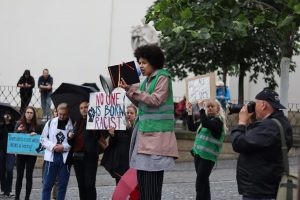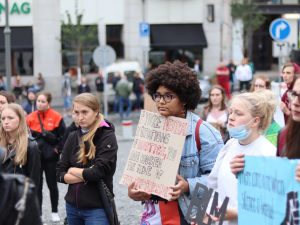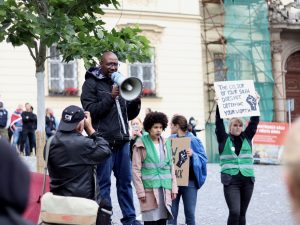Breaking the Silence About Racism: The Impact of Black Lives Matter in Central Europe
Written by Nina Camara
Photography by Adam Grűnwald
Central Europe is one of those places where it has never been easy to talk about racism. In the past, the Communist doctrine condemned it and the topic became a taboo, although prejudice has always existed behind closed doors. Nowadays, with the right of free speech, it feels like opening a can of worms.
Following the end of the former regime, racial divides started to manifest more openly. In countries like Slovakia and Czech Republic, the negative rhetoric about race stems mainly from a tense relationship between the white and non-white population, the majority of whom are of the Roma descent. Unfortunately, the problems between the two groups have not been resolved over the years but become worse. Even though it is finally becoming possible to have an open conversation, the newly-found ‘freedom of speech’ has been embraced by many as an opportunity to vent anger at the other side, rather than as a tool for constructive discussion.
It comes as no surprise that this mindset has created harmful narratives which have led to stereotyping, segregation and sometimes also physical violence. Though the Roma people are often the main target, it is not uncommon to witness the same treatment used against anyone with a darker skin tone.
Living in this kind of environment as a person of colour is very challenging and silence can be a coping mechanism. For years, I used it myself, thinking that it was pointless to ‘feed a troll’ and respond to ignorant comments. Society is also good at teaching us to ignore racist behaviour, excuse it or rationalise it based on comparisons with other places.
However, having a lack of information about different forms of racism it is easy to start to accept it as normal, or even worse, internalise it. Choosing to challenge racist views can lead to long, fruitless discussions which are often emotionally draining because those who support racism have done their homework and collected resources to justify it. Many of us, on the other hand, lack the information and specific terms that we can use to explain what is wrong about a certain type of behaviour or comment.
It is therefore hardly surprising that it took no less than a global movement like Black Lives Matter to shake things up and give people (of all shades) the confidence to say racism exists here and it is not OK.
However, unlike in Western countries, the local crowd was a lot smaller. The black diaspora in Central Europe is still quite fragmented and lacks a collective voice, which is why it is amazing for me to see that they still managed to stand together in solidarity against racism, alongside their white supporters and friends.
Reflections on Organising Black Lives Matter in Brno
In 2020, Black Lives Matter protests took places in big cities across Slovakia and Czech Republic including Prague, Bratislava and Brno. Overall, the events attracted a polarised response from the media and general public.
Recently I spoke with Becky, an organiser of the Black Lives Matter protest in Brno, who experienced that first-hand. She organised the event with the help of her friends and also had support from the local authority. The idea was met with both enthusiasm and hostility, mainly from the local group ‘Slusni lide’ (Respectable Citizens), whose behaviour towards the organisers proved they are the exact opposite. They turned up to the event carrying confederate flags and a banner stating ‘Police is not to blame for your f****d up lives. All lives matter’ and kept jeering at the speakers, making monkey noises and throwing tomatoes until the police intervened.
What did you want to change with this event?
I organised this event for several reasons. I wanted to prove that people of Brno are not benevolent towards the current situation in America and we are not afraid to talk about it. I also wanted to discuss the racism that’s happening here because a lot of people like to think that it is definitely not an issue in this country. I also wanted to express solidarity with all ethnic minorities, show them that they are not alone in this fight and also give people a safe space where they can talk openly, and a lot of people have their back.
Could you tell us about the process of organising it and who helped you?
Organising the event was challenging, especially because of polarized views on the incident. On one hand I was supported by many people who were telling me not to be afraid. However there was also a wave of hostility once the event was announced, mainly from an organisation called Slusni lide (Respectable Citizens), who were brazen enough to post disgusting and insulting comments whenever they could. When I asked the city council for more security, they suggested cancelling the event to keep everyone safe. They weren’t forcing me to do it and said they supported me but still, they were worried whether the gathering was going to be counterproductive. In the end, I did not give up because I did not want that hatemongering organisation to win. Our mission was truly humankind, it expressed support and solidarity, no hate, so I told myself that I cannot let that hateful group win. My friends also helped me, we crafted banners together and cooperated throughout the event.
How did people close to you react when you told them about the idea?
As I mentioned, there was lots of hostility but also lots of support. Everyone was telling me not to be scared and that it was important to go ahead with it. Understandably, my parents weren’t very thrilled, but I think that eventually they were happy and proud that I carried on ‘til the end.
After you announced the event via your social channels there were people who started to attack and threaten you. What motivated you to get on with it?
There were many more who reacted than the ones from the above-mentioned group. I could not understand why many were outraged about the name Black Lives Matter. We never said that black lives are above the white ones. That’s probably due to their lack of awareness of the context. I was very surprised to see some of those who commented were attacking the concept and correcting it to ‘All Lives Matter’, saying that ‘Blacks are doing well here, they wouldn’t live here otherwise’ and that ‘racism in Czech Republic doesn’t exist and if so only against white people’ but following that comment you could see statements such as ‘White Lives Matter’ or ‘N….rs belong to plantations and not to cities’. I would appreciate it if they at least were consistent with those ignorant views, they just embarrassed themselves otherwise. I was motivated mainly by my personal circles who firmly stood by me and also the idea that it is really important to talk about these things in public, otherwise nothing will change.
Can you recall some nice feedback from the participants?
I received nice feedback from everyone who joined, it was moving that all of them waited around after the event ended so they could say thanks or express acknowledgement, satisfaction and hope. Frankly, I didn’t expect that but it may have also been because the members of Slusni lide were shouting at me from on the other side but I did not let that shake me up.
What did this event give you on a personal level?
Personally, it has brought me some kind of self-confidence and a feeling of support. I have never seen many of those who turned up before, but they still were able to empathise and stand by me, which is a feeling I thought I’d probably never experience.
Other Black Lives Matter Demonstrations
The largest of the protests was attended by about 300 people who laid down across Prague’s Old Town Square for 8 minutes and 46 seconds, the amount of time George Floyd was pinned to the ground until he died. The local theatre which supported the initiative received a lot of negative feedback.
This protest took place at the Hviezdoslav square and was attended by 500 people. In the crowd there were members of the Slovak African Community, Slovaks with African origin as well as African university students.
The slogans ‘Black Lives Matter’ and ‘Silence kills’ echoed throughout the event. The protest was supported by young artists such as Hoda Jahanpour, an Iranian cellist born in Slovakia; Milan Andre, the Slovak-African-American singer and Kunta J, a Gabonese-Slovak rapper and his crew.





